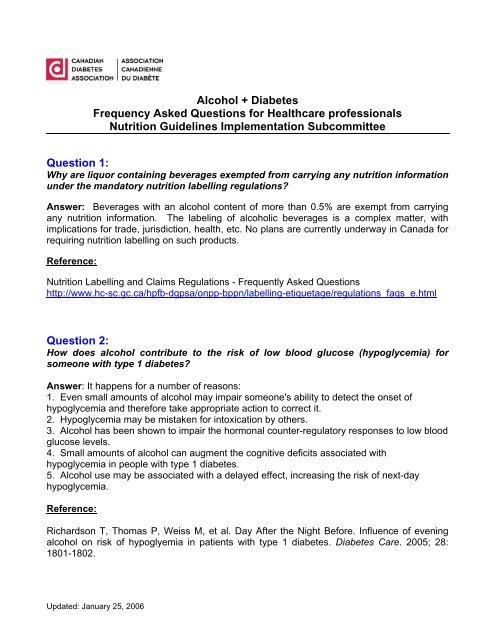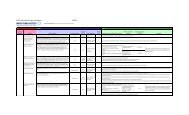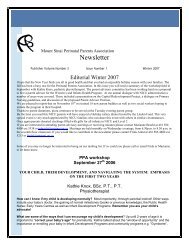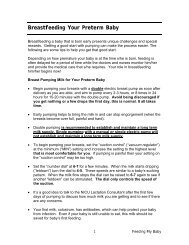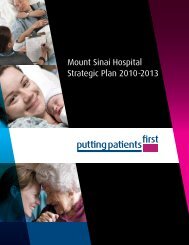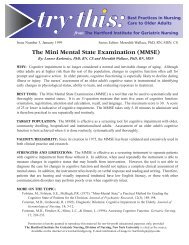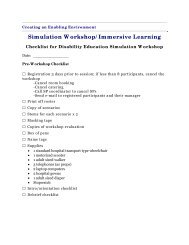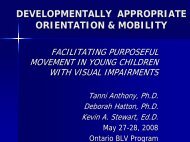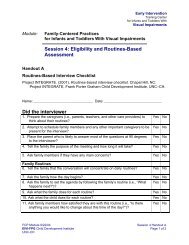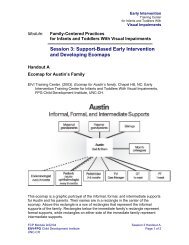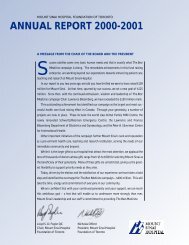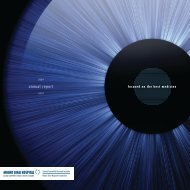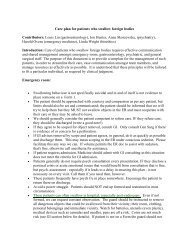Alcohol and Diabetes - Mount Sinai Hospital
Alcohol and Diabetes - Mount Sinai Hospital
Alcohol and Diabetes - Mount Sinai Hospital
Create successful ePaper yourself
Turn your PDF publications into a flip-book with our unique Google optimized e-Paper software.
<strong>Alcohol</strong> + <strong>Diabetes</strong><br />
Frequency Asked Questions for Healthcare professionals<br />
Nutrition Guidelines Implementation Subcommittee<br />
Question 1:<br />
Why are liquor containing beverages exempted from carrying any nutrition information<br />
under the m<strong>and</strong>atory nutrition labelling regulations?<br />
Answer: Beverages with an alcohol content of more than 0.5% are exempt from carrying<br />
any nutrition information. The labeling of alcoholic beverages is a complex matter, with<br />
implications for trade, jurisdiction, health, etc. No plans are currently underway in Canada for<br />
requiring nutrition labelling on such products.<br />
Reference:<br />
Nutrition Labelling <strong>and</strong> Claims Regulations - Frequently Asked Questions<br />
http://www.hc-sc.gc.ca/hpfb-dgpsa/onpp-bppn/labelling-etiquetage/regulations_faqs_e.html<br />
Question 2:<br />
How does alcohol contribute to the risk of low blood glucose (hypoglycemia) for<br />
someone with type 1 diabetes?<br />
Answer: It happens for a number of reasons:<br />
1. Even small amounts of alcohol may impair someone's ability to detect the onset of<br />
hypoglycemia <strong>and</strong> therefore take appropriate action to correct it.<br />
2. Hypoglycemia may be mistaken for intoxication by others.<br />
3. <strong>Alcohol</strong> has been shown to impair the hormonal counter-regulatory responses to low blood<br />
glucose levels.<br />
4. Small amounts of alcohol can augment the cognitive deficits associated with<br />
hypoglycemia in people with type 1 diabetes.<br />
5. <strong>Alcohol</strong> use may be associated with a delayed effect, increasing the risk of next-day<br />
hypoglycemia.<br />
Reference:<br />
Richardson T, Thomas P, Weiss M, et al. Day After the Night Before. Influence of evening<br />
alcohol on risk of hypoglyemia in patients with type 1 diabetes. <strong>Diabetes</strong> Care. 2005; 28:<br />
1801-1802.<br />
Updated: January 25, 2006
Question 3:<br />
Can people with type 2 diabetes get DKA?<br />
Answer:<br />
While it normally occurs in people with type 1 diabetes, people with type 2 diabetes can<br />
develop it.<br />
DKA (diabetic ketoacidosis) is a life-threatening condition. It results from an absolute or<br />
relative insulin deficiency <strong>and</strong> is characterized by high blood glucose (hyperglycemia), too<br />
many ketones (ketosis), an electrolyte imbalance with a low blood pH (acidosis) <strong>and</strong><br />
dehydration.<br />
DKA may develop very quickly with no prior signs or symptoms. More typically, however, it<br />
develops within 24 hours with symptoms of high blood glucose being present for up to<br />
several days.<br />
The symptoms of DKA include:<br />
• Symptoms of hyperglycemia [polyuria (excessive urination), polydipsia (excessive<br />
thirst), blurred vision, weight loss <strong>and</strong> polyphagia (hunger) if insulin deficiency is<br />
present for days or weeks]<br />
• Gastrointestinal symptoms (nausea, vomiting, abdominal pain)<br />
• Respiratory symptoms (an inability to “catch one’s breath”; deep, sometimes rapid,<br />
breaths)<br />
• Non-specific symptoms (weakness, lethargy, malaise <strong>and</strong> headache)<br />
While there are no specific signs of DKA, a person might suspect DKA if they have the<br />
following:<br />
• Hypothermia (although a fever could suggest an associated infection)<br />
• Hyperpnea (deep breaths which reflect a response to acidosis)<br />
• Acetone breath (this ketone, excreted by the lungs, has a fruity odour)<br />
• Dehydration<br />
• Acute abdomen (tenderness; reduced bowel sounds; <strong>and</strong> sometimes guarding –<br />
especially in children). Severe DKA may lead to bowel signs which would normally<br />
suggest a surgical emergency – however, these signs disappear after treatment in<br />
virtually all cases.<br />
• Changes in mentation (alertness may vary from normal to comatose. The changes<br />
correlate best with serum osmolality)<br />
• Decreased reflexes (if serum potassium is affected before or during treatment)<br />
The cause of DKA varies. Infection <strong>and</strong> illness are leading causes (about 30-40% of cases).<br />
These conditions cause a person’s body to increase their levels of hormones<br />
(glucocorticoids) which cause the liver to produce more glucose. Other hormones<br />
(epinephrine <strong>and</strong> norepinephrine) are also increased causing a breakdown of glycogen into<br />
glucose. Insulin deficiency <strong>and</strong> increased levels of certain hormones that act against insulin<br />
(counterregulatory) also lead to the breakdown of triglycerides. The excess free fatty acids<br />
Updated: January 25, 2006
from the triglycerides are converted to ketones while the glycerol is converted to more<br />
glucose. Because the “spilling over” of high levels of glucose into the urine brings extra water<br />
with it, hyperglycemia leads to dehydration as well as to electrolyte depletion.<br />
New onset of type 1 diabetes or not taking enough insulin (due to psychological problems,<br />
fear of weight gain, fear of hypoglycemia or lack of underst<strong>and</strong>ing of sick day management,<br />
for example) also commonly lead to DKA. Another potential source of inadequate insulin<br />
leading to DKA is related to problems with insulin pumps. These problems can include<br />
blockages or crimping of the tubes.<br />
In terms of alcohol <strong>and</strong> DKA, excessive alcohol intake can lead to poor diabetes control (e.g.<br />
problems with medication/blood sugar balance, etc...) which can contribute to DKA. Also,<br />
while not directly causative, in some people with type 2 diabetes excess alcohol can worsen<br />
dehydrating conditions (e.g. vomiting) <strong>and</strong> thereby contribute to the development of DKA<br />
(particularly when blood glucose levels are elevated as may occur when high sugar/starch<br />
alcohols such as home brews are consumed or infections are present, for example).<br />
References:<br />
Personal correspondence: Dr. Stewart Harris, MD MPH CCFP ABPM, The University of<br />
Western Ontario<br />
«A Core Curriculum for <strong>Diabetes</strong> Educators: <strong>Diabetes</strong> <strong>and</strong> Complications», American<br />
Association of <strong>Diabetes</strong> Educators, Marion Franz, MS RD LD CDE, editor (2001).<br />
Question 4:<br />
What is the link between alcohol intake <strong>and</strong> nerve damage (neuropathy)?<br />
Answer:<br />
<strong>Alcohol</strong> intake is considered one of many risk factors for developing nerve damage or<br />
neuropathy, which is one of the complications of diabetes.<br />
If you already have nerve damage (neuropathy), alcohol intake can increase the pain,<br />
burning, tingling, numbness <strong>and</strong> other symptoms found with nerve damage. Significant<br />
alcohol intake can lead to further nerve damage.<br />
References:<br />
The American <strong>Diabetes</strong> Association http://www.diabetes.org/all-about-diabetes/diabetesnews/enews-archive/05-06-04.jsp<br />
The American <strong>Diabetes</strong> Association http://www.diabetes.org/type-1-diabetes/alcohol.jsp<br />
International Guidelines on the Out-patient management of Diabetic Peripheral Neuropathy.<br />
The Medicine Group (Education) Ltd, 1998.<br />
Updated: January 25, 2006
Question 5:<br />
My client has type 1 diabetes. Graduation is coming up <strong>and</strong> drinking more than the<br />
recommended guidelines is a strong possibility. What do I need to discuss?<br />
Answer: An educator should remind the person to:<br />
- Wear identification indicating that the diagnosis of diabetes.<br />
- Inform friends that if the person “passes out” they need to call an ambulance.<br />
- Keep a blood glucose monitor available to check blood glucose.<br />
- Eat sources of carbohydrates to prevent hypoglycaemia.<br />
- Have the adult monitor patient’s blood glucose every 2 hours until the patient is awake<br />
enough the next day to do so him/herself<br />
- Eat a snack containing sources of carbohydrate before going to sleep<br />
- Take usual bedtime insulin but if forgotten, take it late but decrease dose by 20%.<br />
- Have a responsible person take patient to ER if he/she is vomiting, unable to keep blood<br />
glucose >4mmol/L, has a change in respirations, is showing signs of dehydration, is<br />
unconscious, or there is a concern about alcohol poisoning. The medical staff must be<br />
told that the person has been drinking.<br />
- Get up the next day as close to the usual time as possible, take insulin, eat breakfast<br />
<strong>and</strong> continue monitoring blood glucose.<br />
- Monitor blood glucose levels throughout the day after the drinking occurred <strong>and</strong> make<br />
appropriate adjustments to insulin based on blood glucose results <strong>and</strong> keeping in mind<br />
that hypoglycemia can occur up to 14 hours after alcohol consumption.<br />
Question 6:<br />
Why might Glucagon injection not work as effectively for treating hypoglycemia while<br />
alcohol is in the body?<br />
Answer:<br />
Endogenous glucagon is a pancreatic counterregulatory hormone, which is secreted in<br />
response to low blood glucose levels. Its main role is to restore low blood glucose levels by<br />
generating a ready supply of glucose. It accomplishes this in two ways. Principally, glucagon<br />
stimulates the breakdown of liver glycogen stores, converting them to glucose through a<br />
process called glycogenolysis. In addition to mobilizing liver glycogen stores, glucagon<br />
stimulates hepatic gluconeogenesis through conversion into glucose of gluconeogenic<br />
substrates such as alanine, pyruvate, lactate, <strong>and</strong> glycerol.<br />
<strong>Alcohol</strong> can interfere with the process of gluconeogenesis. This occurs during the metabolism<br />
of alcohol, in which there is depletion of the supply of pyruvate needed for gluconeogenesis.<br />
As a result, alcohol by itself may lead to hypoglycaemia or delay recovery from<br />
hypoglycaemia.<br />
It is important to realize that the behaviour-altering effects of alcohol can also complicate<br />
hypoglycaemia by clouding the recognition of hypoglycaemia by the patient <strong>and</strong> his<br />
surroundings, as well as by delaying the treatment of hypoglycemia with prompt oral glucose<br />
Updated: January 25, 2006
supplementation. <strong>Alcohol</strong> consumption may therefore have serious implications in the case<br />
of severe hypoglycaemia, in which a person is unable to self-treat. Usually persons are<br />
taught to inject exogenous glucagon s.c. or i.m. as an antidote to reverse severe<br />
hypoglycaemia. Though alcohol interferes with gluconeogenesis, it may only pose a<br />
theoretical concern in the setting of exogenously administered glucagon. This is because of<br />
the supraphysiologic blood levels of glucagon achieved following an s.c. or i.m. injection, <strong>and</strong><br />
alcohol’s lack of effect on the glycogenolytic pathway. It is therefore unlikely that alcohol, on<br />
its own, would prevent the reversal of hypoglycaemia following the administration of<br />
glucagon.<br />
In the setting of chronic alcoholism, however, liver glycogen stores may become depleted<br />
secondary to malnutrition (or a reduced supply of substrate). The efficacy of glucagon, as a<br />
treatment for reversing severe hypoglycaemia, may therefore be significantly reduced. This is<br />
because both the glucagon-stimulated metabolic processes for generating glucose, namely<br />
glycogenolysis <strong>and</strong> gluconeogenesis, have been compromised, either indirectly or directly. In<br />
such a scenario, the preferred treatment for reversal of severe hypoglycaemia would be the<br />
administration of intravenous glucose.<br />
In patients with an absent or diminished endogenous glucagon response to low blood<br />
glucose (i.e. type 1 diabetes), reversal of severe hypoglycaemia ⎯ particularly when<br />
secondary to insulin ⎯ may be more difficult to achieve with exogenous glucagon in the<br />
presence of alcohol. In this case, treatment with intravenous glucose may be preferred.<br />
References:<br />
Glucagon product monograph, CPS 2005, Compendium of Pharmaceuticals <strong>and</strong> Specialities,<br />
The Canadian Drug Reference for Health Professionals, Canadian Pharmacists Association.<br />
Griffin, JE, Ojeda, SR., editors. Textbook of Endocrine Physiology (3 rd<br />
University Press, 1996.<br />
edition). Oxford<br />
Cryer PE, Davis SN, Shamoon H. Hypoglycemia in diabetes. <strong>Diabetes</strong> Care 2003; 26: 1902-<br />
1912.<br />
Rasmussen BM, Lotte O, Schmitz O, Hermansen K. <strong>Alcohol</strong> <strong>and</strong> glucose counterregulation<br />
during acute insulin-induced hypoglycaemia in type 2 diabetes. Metabolism 2001; 50: 451-7.<br />
Bartlett D. Confusion, somnolence, seizures, tachycardia? Question drug-induced<br />
hypoglycaemia. Journal of Emergency Nursing 2005; 31: 206-8.<br />
Turner BC, Jenkins E, Kerr D, Sherwin RS, Cavan DA. The effect of evening alcohol<br />
consumption on next-morning glucose control in type 1 diabetes. <strong>Diabetes</strong> Care 2001; 24:<br />
1888-93.<br />
Updated: January 25, 2006
Question 7:<br />
Can alcohol be consumed when an individual is taking oral hypoglycemic agents or<br />
insulin?<br />
Answer:<br />
Risk of hypoglycemia is increased with the use of insulin or insulin secretagogues (i.e.,<br />
glyburide, gliclazide, glimepiride, chlorpropamide, tolbutamide, nateglinide, repaglinide).<br />
Consuming alcohol further increases the risk of hypoglycaemia.<br />
There is no increase in the risk of hypoglycemia with the use of acarbose, pioglitazone,<br />
rosiglitazone or metformin. However, many individuals are on combination therapies, which<br />
may include insulin <strong>and</strong>/or insulin secretagogues. In these instances the risk of<br />
hypoglycaemia would be increased <strong>and</strong> consuming alcohol further increases the risk of<br />
hypoglycemia.<br />
An increased risk for the development of lactic acidosis occurs if large amounts of alcohol are<br />
consumed, either acutely or chronically, while taking metformin. Excess alcohol intake,<br />
whether acute or chronic, is not advised when an individual takes metformin.<br />
In the setting of severe hypoglycaemia complicated by concomitant alcohol <strong>and</strong> insulin<br />
secretagogue therapy, exogenously administered glucagon will acutely reverse the<br />
hypoglycaemia, but its blood glucose-raising effect may be too short-lived to prevent<br />
subsequent hypoglycaemia, which may be more likely to occur with the use of longer-acting<br />
insulin secretagogues. In such a case, maintenance of euglycemia may require medical<br />
intervention through intravenous glucose until the hypoglycemic effect of the insulin<br />
secretagogue has resolved.<br />
Individuals should consult their physician or pharmacist if they require further information.<br />
Reference:<br />
Product monographs, CPS 2005, Compendium of Pharmaceuticals <strong>and</strong> Specialities, The<br />
Canadian Drug Reference for Health Professionals, Canadian Pharmacists Association.<br />
Updated: January 25, 2006


